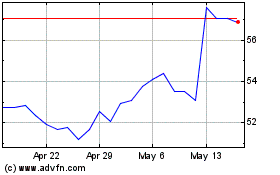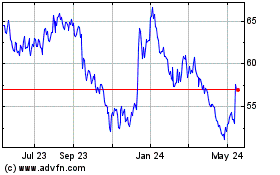Incyte Corporation (NASDAQ:INCY) presented positive long-term
clinical results today from an ongoing open-label Phase II trial
for INCB18424, its selective, oral JAK1 and JAK2 inhibitor, in
patients with advanced polycythemia vera (PV) and essential
thrombocythemia (ET). PV and ET, along with myelofibrosis (MF), are
blood cancers that belong to a group of diseases known as
myeloproliferative neoplasms (MPNs). The data showing long-term
clinical activity, including reduction in spleen size, phlebotomy
independence (in PV patients) and improvement in blood counts
lasting up to 27 months, were presented in an oral session
(Abstract #313) at the 52nd American Society Hematology Annual
Meeting in Orlando, FL. (ASH PV/ET Presentation)
“These positive and sustained results in PV and ET achieved
across multiple endpoints, combined with the positive data we’ve
reported in MF, further support our confidence in the potential
broad utility of INCB18424,” said Paul A. Friedman, M.D., Incyte
President and Chief Executive Officer. “With our forthcoming Phase
III MF results and the recent initiation of the Phase III trial in
PV with our partner Novartis, INCB18424 is the most advanced JAK
inhibitor compound in development for MPNs.”
With a median duration of 21 months of follow-up, clinical
responses observed in 34 patients enrolled with PV included durable
improvements in splenomegaly (spleen enlargement), hematocrit
control and symptomatic burden including pruritus, night sweats and
bone pain. Clinical responses seen in 39 patients enrolled with ET
included long-term reductions in elevated platelet and white blood
cell counts, and, when present, splenomegaly and constitutional
symptoms.
“It is encouraging to see that treatment with INCB18424 provided
long-term clinical benefit in this Phase II trial, with ongoing
responses observed in patients who now have up to 27 months of
follow-up,” said Srdan Verstovsek, M.D., Ph.D., Associate
Professor, Leukemia Department, Myeloproliferative Disorders
Program Leader, University of Texas M.D. Anderson Cancer Center,
and INCB18424 principal investigator. “This is particularly notable
given the fact that the enrolled patient populations were
refractory to, or intolerant of, hydroxyurea, our current standard
of care for these chronic and under-served disorders. Importantly,
INCB18424 has been well tolerated in these advanced patients, with
mechanism-based hematologic changes effectively managed with
individualized dose titration.”
Study 18424-256 is an ongoing, multi-center, single-arm,
open-label Phase II study being conducted in the United States and
Italy. An initial 8-week run-in evaluation established 10 mg and 25
mg twice daily as starting doses for expansion cohorts in PV and
ET, respectively; dose adjustments for safety and efficacy were
allowed so that each patient could be titrated to his or her most
appropriate dose.
Key Efficacy Findings
PV patients: After a median follow-up of 21 months, 97% of
enrolled patients (n=34) achieved hematocrit control to ≤45% in the
absence of phlebotomy. All patients continued to maintain
phlebotomy-independence at the time of their last follow-up visit.
Splenomegaly was present in 74% of patients at entry; 80% of
patients achieved a ≥ 50% reduction in palpable spleen length and
68% have achieved complete resolution. Leukocytosis (white blood
cell count elevation > 15x109/L) was present in 44% of patients
at baseline, and counts normalized in 73%. Thrombocytosis (platelet
count elevation > 600x109/L) was present in 38% of subjects
at baseline, and counts normalized in 69%. Improvements in patient
reported symptoms of pruritus, bone pain, and night sweats have
been observed in the majority of patients as of the last follow-up
visit.
ET patients: After a median follow-up of 21 months, 49% of
enrolled patients (n=39) normalized platelet counts, and 79%
achieved platelet counts 1000x109/L at baseline, 13 (93%)
experienced > 50% reduction. WBC counts for patients with
baseline counts > 10x109/L normalized within the first month and
were maintained for a median duration of 14 months. Palpable
spleens completely resolved in 3 of 4 patients with baseline
splenomegaly; 1 reduced >50% from baseline.
Safety
The adverse events associated with INCB18424 in this study were
consistent with the safety profile established by previous trials
with INCB18424 in MPNs. Drug-related adverse events were generally
mild-to-moderate in intensity and manageable with dose
adjustments.
PV patients: Six patients (18%) discontinued therapy (2 for
adverse events (AEs), 2 withdrew consent, 1 for no response and 1
for disease progression). Grade 3 AEs potentially related to study
medication included thrombocytopenia (2), neutropenia (1), renal
tumor (1), asthenia (1), viral infection (1), and atrial flutter
(1). No Grade 4 drug-related AEs have occurred.
ET patients: Eleven patients (28%) discontinued therapy (4 for
AEs, 2 withdrew consent, 5 for no response). Grade 3 AEs
potentially related to study medication included leukopenia (2
patients), GI disorder (1), and peripheral neuropathy (1). No
Grade 4 drug-related AEs have occurred.
About Myeloproliferative Neoplasms (MPNs)
MPNs are a related group of hematological neoplasms
characterized by dysfunction of the bone marrow resulting in either
over production of blood cells or ineffective hematopoiesis. The
three main Philadelphia-negative MPNs are myelofibrosis,
polycythemia vera and essential thrombocythemia.
Myelofibrosis is associated with bone marrow failure,
splenomegaly and debilitating symptoms, transformation to acute
myelogenous leukemia and shortened survival. MF occurs as primary
or secondary MF. Primary MF presents as MF without any other
etiology. Secondary MF includes post-polycythemia vera MF and
post-essential thrombocythemia MF, which are progressions of PV or
ET to MF.
Polycythemia vera is a blood cancer characterized by the
overproduction of red blood cells which increases blood viscosity
and leads to elevated thromboembolic risk. Increased levels of
white blood cells and platelets are also common. In advanced
disease, patients frequently exhibit spleen enlargement and
debilitating symptoms including pruritus, night sweats, fatigue,
and muscle and bone pain.
Essential thrombocythemia is characterized by uncontrolled
proliferation of myeloid lineage cells, especially megakaryocytes,
leading to the overproduction of platelets. Common complications
include thrombotic events and bleeding. Patients with advanced
essential thrombocythemia may also experience splenomegaly as well
as symptoms including fatigue, headache, night sweats, and muscle
and bone pain.
About INCB18424
INCB18424 is Incyte's lead internally developed JAK1 and JAK2
inhibitor that entered Phase I clinical testing in May 2007 and has
shown positive clinical activity in a number of hematology and
inflammatory conditions.
In November 2009, Incyte and Novartis announced a collaboration
and license agreement for two hematology-oncology programs in which
Incyte retained exclusive rights to develop and commercialize
INCB18424 in the U.S. and Novartis received exclusive rights to
develop and commercialize INCB18424 for territories outside the
U.S. Novartis also received worldwide rights for Incyte's cMET
Inhibitor, INCB28060.
The compound is currently in Phase III development for patients
with myelofibrosis and for patients with advanced polycythemia
vera. A global Phase III registration trial called RESPONSE
(Randomized, open label, multicenter phase III study of
Efficacy and Safety in POlycythemia vera
subjects who are resistant to or intolerant of hydroxyurea: JAK
iNhibitor INC424 tablets verSus bEst available
care) is now open to enrollment in the U.S. (for additional
information go to: ClinicalTrials.gov identifier: NCTO1243944 or
http://www.responsetrial.com) and will open in countries outside
the U.S. in early 2011.
About Incyte
Incyte Corporation is a Wilmington, Delaware-based drug
discovery and development company focused on developing proprietary
small molecule drugs for oncology and inflammation. For additional
information on Incyte, visit the Company's web site at
www.incyte.com.
Forward-Looking Statements
Except for the historical information contained herein, the
matters set forth in this press release, including statements that
the data from an ongoing Phase II trial of INCB18424 in PV provide
further evidence of potential broad clinical utility of INCB18424
and show potential long-term clinical activity, including reduction
in spleen size, phlebotomy independence (in PV patients) and
improvement in blood counts lasting up to 27 months, that top-line
data from a U.S. Phase III clinical study (COMFORT-I) in
myelofibrosis are expected this month, are all forward-looking
statements within the meaning of the "safe harbor" provisions of
the Private Securities Litigation Reform Act of 1995. These
forward-looking statements are subject to risks and uncertainties
that may cause actual results to differ materially, including the
high degree of risk and uncertainty associated with drug
development and clinical trials, the ability to enroll a sufficient
number of patients, unanticipated developments in the efficacy or
safety of INCB18424, the results of further research and
development, and other risks detailed from time to time in Incyte's
filings with the Securities and Exchange Commission, including its
Quarterly Report on Form 10-Q for the quarter ended September 30,
2010. Incyte disclaims any intent or obligation to update these
forward-looking statements.
Links to third-party websites or pages are provided for
convenience only. Each website is subject to its own terms of use,
and we encourage you to consult these policy statements. Incyte has
no control over third party sites and does not endorse or recommend
these sites, and expressly disclaims any responsibility for the
accuracy of content or opinions set forth in any third-party
website or your use of that information.
Incyte (NASDAQ:INCY)
Historical Stock Chart
From Nov 2024 to Dec 2024

Incyte (NASDAQ:INCY)
Historical Stock Chart
From Dec 2023 to Dec 2024
